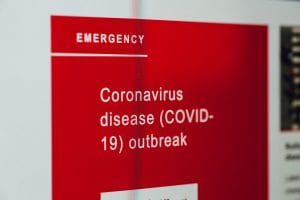Of course you are worried. One way to gain a sense of control in these turbulent days is to prepare now for what might happen. What will you do if you or your partner gets sick and needs medical care? As a grandparent raising grandchildren you probably have complicated arrangements about who cares for your children. At the same time, you are constantly being reminded that your own risk is higher due to your age.

An emergency plan now will allow you to do what needs to be done…if.
For You: Create a personal support network, or Circle of Care
American Red Cross advice starts with the concept of “a personal support network” made up of several individuals who will check in on you in an emergency, to ensure your wellness and to give assistance if needed. In a Circle of Care, you will be doing the same thing for others in your group. A network or Circle of Care can consist of friends, roommates, family members, relatives, personal attendants, co-workers and neighbors. Ideally, a minimum of three people make up your personal network.
There are things you can discuss and implement with your personal support network:
- Make arrangements to check on each other regularly and, if needed, offer assistance.
- Collect relevant emergency documents, phone numbers, DHS contact person, relatives’ phone numbers and place them near the front door in a labeled envelope or box.
- Agree on and practice methods for contacting each other in an emergency.
- Post the names and contact phone numbers of others in your circle on the refrigerator door where they can be found easily.
- Agree to notify others in the group if you go out of town and when you will return.
Remember your relationships should be mutual. Everyone contributes as they are able. For more, see this at Age+
For Your Children: Create A Love Folder
What might make it easier on the children if they need to live elsewhere for a time? What would you like a new caregiver to know?
Start with those special things you know about the children that other people may not know.
Describe or photograph special toys, blankets, clothes that provide comfort to young ones. Mention television shows or regular activities that could cause a meltdown if they are missed. What routines and objects can provide sense of continuity and stability for your children.
Disclose the children’s favorite and hated foods, allergy information and any special circumstances. For example, “My niece is allergic to peanuts” or “I promised my grandson he would never have to eat tomatoes, as his dislike for them dated back to a beating he endured when his birth parents tried to force him to finish a meal.”
Share parenting insights you learned, such as: “Always use a calm voice and never make sudden moves or Lola flashes back to the abuse from her mom’s ‘boyfriends,’ and she will cower and hide.”
The children’s’ outside world – a checklist by the door
- The names and contact information for your kiddos’ best friends, schools, teachers, doctors, dentists, and counselors.
- If your grandchild has special needs, write about it with dates and places, and name names.
- If there are other adults or peers to whom the kids are especially close, again name names.
- If medications are needed, note their location, the dosages, the time of day given, the prescribing provider, and reason it is being taken. With some meds even a brief lapse is critical and if this is so include instructions for what to do in case of missed dosage.
- Include caseworker’s contact information and all government programs providing benefits such as SNAP (food stamps), Medicaid, or Supplement Security Income (SSI).
- Think ahead about how emergency responders can find important information if it is on your locked computer or phone. In case of emergency, is there someone who can retrieve needed documents? And would they be able to find them?
Here are more ideas for you can do now to prepare for an unplanned separation from your children. Or read the Red Cross booklet especially for seniors.
Make sure your end-of-life documents are up to date
It’s not a pleasant topic, but dealing with end-of-life issues when you are well will take an enormous burden off your loved ones should an emergency arise. For Oregon residents, you’ll find information about a health care representative which will designate someone to make health decisions for you if needed, Many hospitals will now keep advanced directives in a patient’s medical records if requested. Still, you should also share copies with friends and family members and keep a copy in your digital or home files.

Recent Comments